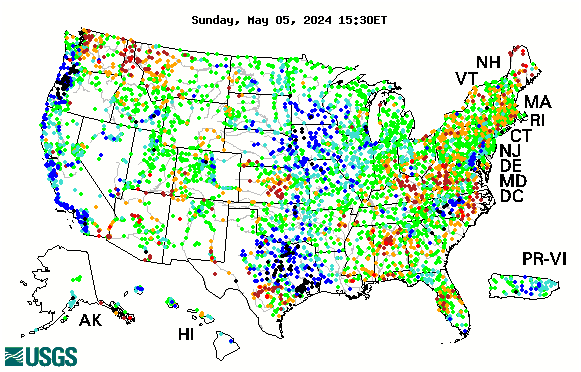 This is one of my favorite views of U.S. climate, providing a quick and easy way to squint and get a feel for what’s going on across the entire continental U.S. It’s the USGS streamflow map, with color showing today’s flow relative to the long term mean for this date. Red’s dry, blue and back are the wettest. It integrates a lot of information into a quickly digestible package, because streamflow integrates over space and time at useful scales.
This is one of my favorite views of U.S. climate, providing a quick and easy way to squint and get a feel for what’s going on across the entire continental U.S. It’s the USGS streamflow map, with color showing today’s flow relative to the long term mean for this date. Red’s dry, blue and back are the wettest. It integrates a lot of information into a quickly digestible package, because streamflow integrates over space and time at useful scales.

John, can you imagine any possible connection between those red states and the massive open West Arctic Ocean? It is time climatologists and meteorologists look at the impact of Arctic ice meltback in the Northern Hemisphere. It is likely impacting more than polar bears.
John –
That’s a great question. There was an interesting piece in the San Diego Union Tribune last month quoting a researcher named Jacob Sewall suggesting as much:
http://www.signonsandiego.com/news/nation/20070927-9999-1n27icemelt.html
John, the prospect of an interconnected Arctic Ocean might be getting more traction but the discussion and need to have answers is overshadowed by the ice melt stats.
The super-saturation of news articles, blogs, etc focused only on the discussion of melted ice ignore the paramount issues of what does this mean to NH climate; and particularly western NA temp and precip patterns.
At least one meteorologist, Stu Ostro, Senior Meteorologist with the Weather Channel is trying to understand impacts of ice melt aside from reducing polar bear habitat.
His blog at:
http://climate.weather.com/blog/9_13685.html
offered the following observation:
[And the Arctic is interconnected with the rest of the world. Some who are skeptical of the seriousness of global warming like to point out that there’s uncertainty in the forecasts made by global climate models. I’m certainly not one to argue with model uncertainty; in fact, a couple of my blogs on weather.com about recent tropical storms and hurricanes focused on errors in the weather models which entail much shorter-range forecasts than climate models. But what seems to be happening is that if the latter are erring in one direction, it’s that they have failed to predict the rapidity with which some of the climate-related changes are taking place. ]
I say, lets get past the hand wringing about extent of ice melt and get on with understanding its global implications for world grain supplies and hydro power in the West.
It is time the NSF got into the act and invest as much time and money as it did to write up the Abrupt Climate Change report. We are looking at an abrupt climate change in the Arctic ice melt back but all we can see is the open ocean. There is more to this story but nobody seems ready to write Page Two.